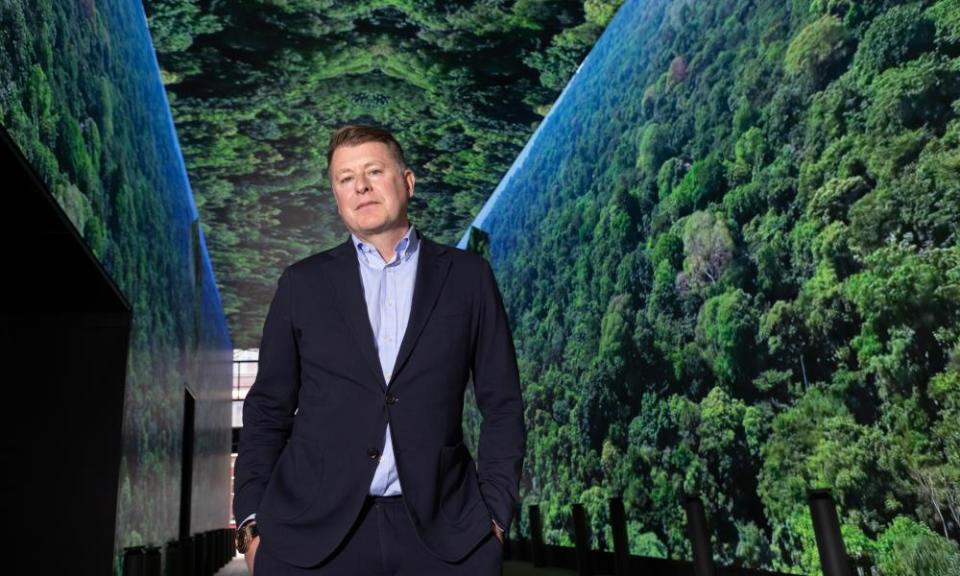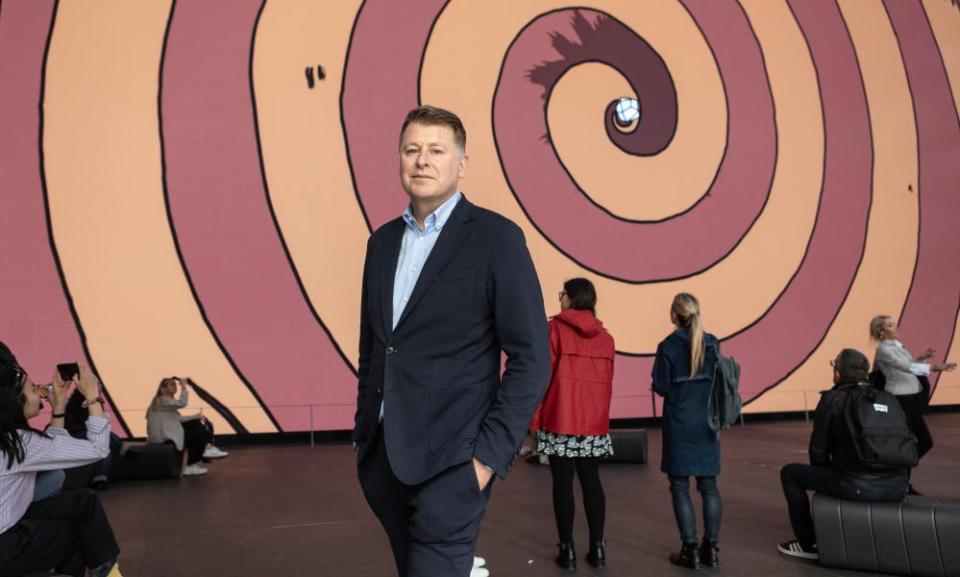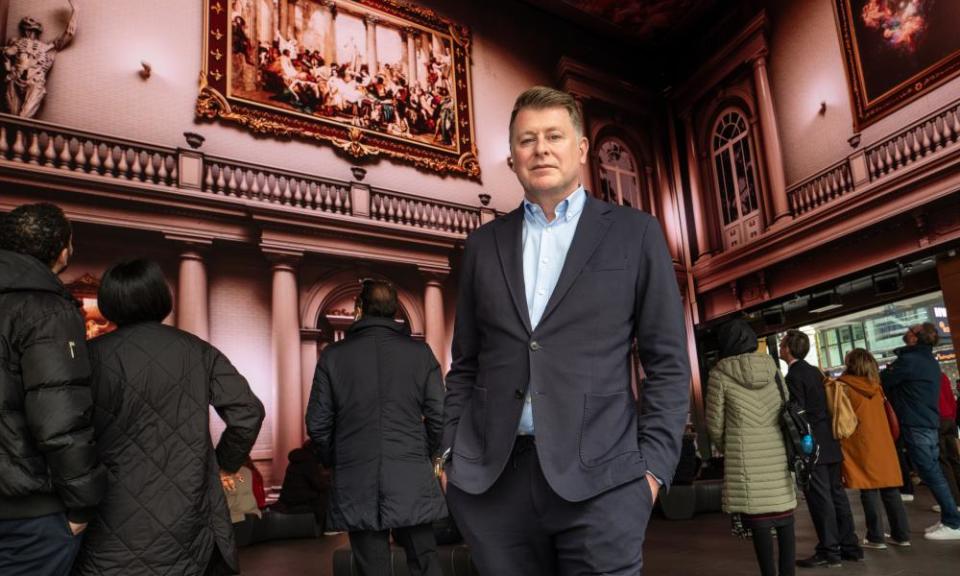Sex Pistols, screens and big brands: Philip O’Ferrall on his vision for media venture Outernet

For a descendant of a 14th-century Knight of the Garter, Philip Bourchier O’Ferrall looks surprisingly at home in a room covered in edgy Sex Pistols graffiti.
We’re standing in a former silversmith’s workshop in London’s Denmark Street that the punk outfit called home in the 1970s, examining frontman John Lydon’s handiwork. In black marker, there’s a drawing of the band’s svengali, Malcolm McLaren, clutching a wad of cash, and on one wall, scrawled in capitals, the words: “Johnny wont go to heaven or the south of France.”
The Pistols’ room, soon available for rent, is a quirky part of an unlikely marriage between the capital’s rock’n’roll heartland and a shiny shrine to advertising that is dividing Londoners.
O’Ferrall is chief executive of Outernet, a media venture in a semi-open building outside Tottenham Court Road tube station wallpapered with high-resolution screens. Dubbed “The Now Building”, it offers what feels like an immersive version of Piccadilly Circus, displaying ads, artwork and TV shows in a space used for public and private events.
The aim is to offer brands and artists a single location for gigs, product launches and premieres. O’Ferrall says it is a “first of its kind” project, part of a property development spanning offices, high-end apartments, a cluster of bars and music venues, a boutique hotel and a planned recording studio. It has been created in partnership with fellow shareholder and low-profile West End property tycoon Laurence Kirschel, who owns the whole complex through his company Consolidated Developments.

It has taken Kirschel, a peer of the late pornographer and Soho kingpin Paul Raymond, more than 100 individual acquisitions and two decades to reach this point. He led the property push, while O’Ferrall liaises with advertisers. The whole Denmark Street development is worth about £1bn, while Outernet’s nascent media revenues are in the “low ten millions”.
O’Ferrall hopes to repeat the model across the globe – but its first outing has not been without issues. One has been preserving the area’s roots: Tin Pan Alley, as Denmark Street is known, was a music industry hub that helped to propel the careers of innumerable musicians, including Jeff Buckley, Adele and David Bowie.
Developers have faced opposition amid concerns its history – and the clutch of high-end musical instrument shops on the street – will be ripped away on a commercial tidal wave of central London revamps.
The redevelopment has also drawn negative architectural reviews, notably towards its golden exterior (“a gross, gold-tinted bauble” – the FT), its cultural nods (“the day music died?” – the Observer) and its polished edges (“why not go the full Vegas?” – the Guardian). “To be able to launch something that’s going to give back so much to the city and the country. It really doesn’t matter what it looks like,” counters O’Ferrall.
“People comment on what an amazing experience they have, or just being able to shelter from the rain. The fact they have an opinion on the colour of the building is irrelevant.” (Incidentally, he says the gold is intended to “fit the palette of global brands for premium product launches”.)
The project faced engineering headaches in preserving the buildings and was beset by delays – although had it launched on time in 2020, the pandemic and hold-ups to Crossrail would have damaged footfall anyway. Since it opened last autumn, numbers have been healthy and the space has hosted eye-catching events, including screening the Brit awards, and Aston Martin’s launch of its Valhalla hybrid supercar.
The cultural element of the project, which aims to draw on Tin Pan Alley’s legacy, has been closely watched. “We’ve enhanced Denmark Street, we’ve preserved so many buildings that would otherwise easily have been retired. We launched three music venues, which is a slightly mad thing to do,” says O’Ferrall, adding that glitzy product launches help pay for the venues’ costly upkeep.
But not everyone agrees. Tensions have emerged with a longstanding tenant, Regent Sounds. An area in the instrument shop once used by the Rolling Stones as a studio has been partitioned off by Consolidated on the promise of being returned when building concludes.
We’ve enhanced Denmark Street, we’ve preserved so many buildings that would otherwise have been retired.
Regent’s owner, Crispin Weir, says: “In order for the Outernet project to succeed long term, Consolidated needs to learn to cooperate with local business owners for the true benefit of the area’s cultural and commercial ecosystem.
“After five long years of waiting for the rightful return of the entirety of our business premises, we’re hoping Consolidated will soon issue us our new lease. This will enable our shop to thrive again, whilst also protecting an important part of London’s musical heritage.”
A spokesperson for Consolidated said: “Regent Sounds is a great shop and, since 2018, we have supported them with a discounted rent below the market rate and covered all costs of refurbishing the building at around £200,000 which they would have been due to pay under the service charge.”
Consolidated has also said it will extend long-term leases on favourable terms to all the music instrument retailers on the street.
O’Ferrall has run the project for five years. He says that, despite his grandiose ancestry – which dates back to Edward of Woodstock, known as the Black Prince – he’s “had to graft like everyone else”. His father, who ran the film and cinema business the Rank Organisation, died when O’Ferrall was a teenager.
He initially pursued a career in entertainment technology, riding the dotcom boom and later working with Nokia to launch the first ever streamed music video on a mobile phone (by Finnish band Kemopetrol). O’Ferrall went on to run digital platforms at MTV, before spending 13 years as executive vice-president at the music TV station’s owner, ViacomCBS.
He retains strong ties with that industry – including as chairman of comedian Alan Carr’s production company, which is on hiatus, and last year fronted a consortium’s bid for Channel 4, before the government abandoned its privatisation.

O’Ferrall, whose husband is British actor Scott Neal, is a vocal diversity advocate and says he would shun advertisers with questionable values. “I don’t think any organisation that wants me to part with millions is going to get any money if they’re not compliant with my way of thinking.”
He and Kirschel now travel the globe, studying sites to “provide a blank canvas for brands to operate in, and complementing that with great content and audience experiences”. New York is next on the list, with three sites under consideration, and Asia, the Middle East and mainland Europe coming later.
It’s clear some elements of the London site will remain unique. We get momentarily lost in the labyrinthine passageways of the 2,000 capacity Here – the largest new events venue in central London since the 1940s – built in “a big hole left by Crossrail”.
A 16th-century forge in a smaller venue, now called the Lower Third, has been preserved.
O’Ferrall is most exercised by the control room, an underground bunker with banks of screens on which we watch Londoners filming the visual effects within the Now building on their smartphones, and see technology automating what is pumped on to the big screens. The executive says the firm has regular terrorist attack drills (he is “gold command”).
“This has been an extremely complex, physical build – with seamless technology and integration. We need to be able to pick up and drop that into the next place,” he says. “There is a great opportunity to bring other partners into Outernet – to bring someone that can be an equity partner and expedite what we’re doing.”
CV
Age 51
Family “I’m married to Beautiful Thing and The Bill actor Scott Neal, who is now a creative director.”
Education HND; MBA at Reading University; fellow of leadership at St George’s House, Windsor Castle.
Pay Undisclosed. “I’m a shareholder in the business and so for this job it is mainly an equity deal.”
Last holiday Atlas mountains.
Best advice he’s been given “As a leader, the more value and energy you put into the business and the team, the more you will get back.”
Biggest career mistake “Going in too early on mobile streaming before the market was even thought of.”
Word he overuses “Genius.”
How he relaxes “I have a little boat on the Thames, which is a haven. Exercising on the Peloton. Commuting on Thames Clipper boats. Walking our dog, Huggy.”

 Yahoo Finance
Yahoo Finance 